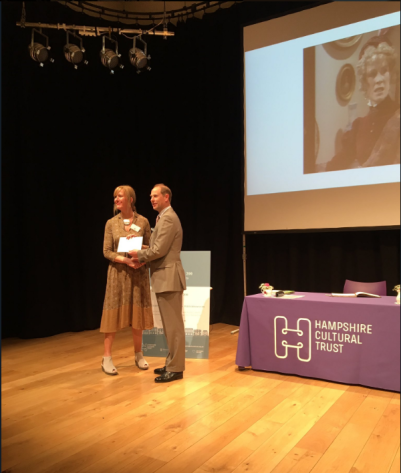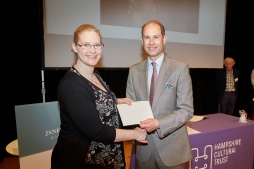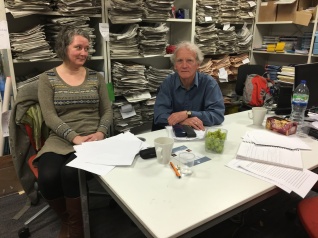
Last August I was invited to the awards ceremony for the Jane Austen Short Story Competition. The event also marked the opening of a Jane Austen exhibition at Winchester Discovery Centre, visited by Prince Edward, Earl of Wessex. I’m not much* of a royalist but it was fascinating to see how these visits work (men in suits and wearing ear-pieces patrolling the library, lots of waiting and chatting with tea and cake, forming a literary ‘horse-shoe’ so the Prince could meet us all easily).
But the real event for me was announcing Sally Tissington as the winner of the short  story competition, and David Constantine announcing Ingrid Jendrzejewski as the runner-up.
story competition, and David Constantine announcing Ingrid Jendrzejewski as the runner-up.
In April this year that we got to see the longlist of 25 entries. (There were almost 300 in total from around the world.) I read the hard-copies I’d been sent many times, each re-read whittling the list down further until I had six that I liked the best. Luckily David had a similar number on his shortlist, and we crossed over with a few. We met (in a stationary cupboard, but with coffee, grapes, and biscuits)  to argue our case for those stories we liked best, while understanding that we had to be willing to let some go. It was a difficult decision.
to argue our case for those stories we liked best, while understanding that we had to be willing to let some go. It was a difficult decision.
This was my first taste of being a judge and on the other side of the fence (I have won both the BBC Radio 4 Opening Lines short story competition, and the Royal Academy / Pin Drop competition), and I enjoyed it so much I’ve agreed to do it again for another short story competition run by Rye Literature Festival.
While I was reading the 25, I jotted down some of the things that made me put a story on the reject pile. This is not a definitive list of what to avoid when writing a short story (even our winners may include some things that made me reject others) – it’s just some subjective observations from those I read, which might be helpful:
- Many stories were lacking enough forward motion (too much internal thought), especially at the start.
- Many stories began with an event in the future and then spooled back, resulting in a pluperfect tense (eg – she had arrived), which meant that the forward motion of the story wasn’t as strong.
- Lots spent too long on the backstory and justifying the actions of the characters. Have I mentioned forward motion?
- Some stories were too big for the word limit, which meant characters, plot and location were skimmed. (Although our runner-up breaks this ‘rule’ to great effect.) Covering a lifetime in 2000 words is tricky to pull off well.
- Nearly all the stories had a cliché or two (or a few more).
- Sometimes the characters didn’t feel real. (This also comes back to avoiding clichés.) Real people have quirks, and ticks, and odd thoughts and mannerisms. I wanted to see these.
- Too many stories had too many typos.
- There were quite a few exclamation marks. And adverbs.
- The majority of the stories were written in the first person. (Third person will open up more possibilities.) But if the writer had decided first person was best, it was those with a really strong narrative voice that worked well for me.
- Many stories didn’t have a powerful enough opening. They lacked the ‘story questions’ I was looking for. I wanted to be intrigued, beguiled, puzzled and above all to have to read on.
- Some endings were lacklustre. I wasn’t looking for things to be tied up neatly, but I wanted some logic and satisfaction.
- A few stories started in the middle of a scene or with dialogue, and this is difficult to get right. It made me think, ‘who are these people, where are they, what’s their relationship?’ rather than paying attention to what was being said.
- And finally – this didn’t make me discard a story but it did niggle – even if the competition didn’t specify layout requirements I saw too many stories with a confusing layout. I would have liked: double-spaced, no extra gaps between paragraphs unless it’s a change of scene, Courier, 12 point, first lines indented unless they were the very beginning or the start of a new section, etc.
Both the winning story, and the runner-up are available to read online here.
I hope this post has been helpful if you write short stories and enter competitions. Do let me know in the comments below.
(*Not a royalist at all in fact.)
A n interesting post eye opening and much appreciated even if your list made me tremble a little. 😉
LikeLiked by 2 people
My list makes me tremble too (as a short story writer). It’s a lot to juggle in one story.
LikeLiked by 1 person
It certainly does.
LikeLiked by 1 person
Bless you for posting this. I’m busy with a course in creative writing as we speak and will provide this link for others to see.
LikeLiked by 2 people
Thank you! I hope the course is going well.
LikeLike
Good pointers Claire, thank you. Have apostrophes been banned though, or just those wrongly used?
LikeLiked by 2 people
That was my typo! Should have been exclamation marks. Good spot.
LikeLiked by 1 person
What an honest eye-opener for writing short stories. There are many rules in what judges like yourself search for. It breaks a habit that many writers, including myself, use. It is very limiting, if I’m being honest, to stick to what is comfortable. There is no room to grow. We are already great writers, those of us who truly love the art, but ordinary, if we do not take the time to grow. Thank you for this post. Very eye-opening.
LikeLiked by 2 people
Thank you. I’m glad you found it helpful.
LikeLike
This is really interesting, especially the second point regarding starting in the future and then going back. I tend to do this a lot, although it usually involves starting in the present tense and then awkwardly transitioning to the past. I wonder if this impacts the momentum or suggests the structure of the story needs work. Plenty to think about!
LikeLiked by 1 person
A very useful list; strong opening, believable characters, momentum and an ending. Thanks for sharing this useful inside information. Actually what really intrigues (and worries) me is how those stories get to the short list. Not all competitions are as fair and anonymous as they claim to be – not suggesting this applies to this one. But that’s another story…
(PS Glad that cupboard was stationary or might have been a bumpy ride!!)
LikeLiked by 2 people
Yes, it is interesting. In this case I know they were judged anonymously, with three readers reading about 100 each, and then swapping the ones they liked to come to a list of 25.
LikeLike
Pingback: Flash Fiction: Jane Deer | Claire Fuller
Thank you for sharing – hope I can keep everything in mind! 🙂
LikeLiked by 2 people
Thanks Dahlia. I hope you found it useful.
LikeLiked by 2 people
Noted. Thanks for posting, advise is always invaluable
LikeLiked by 1 person
Thanks, glad it was helpful.
LikeLike
Heavenly Lawd! This is plenty.
Thanks for sharing this.
I want to go back to my pc now and start looking into my stories again.
But.
I have this problem with ‘moving the story forward’. I wrote one story and it was criticized. “The pace is too fast,” they said. So i kind of write with the pace of a snail these days.
Would that in anyway affect my chances?
LikeLiked by 1 person
By ‘moving the story forward’ I wasn’t necessarily meaning pace (although that’s important too). I meant make something happen in the present time of the story – don’t just give us backstory or internal thoughts, actually have something happen.
LikeLiked by 1 person
Ok. Thanks
LikeLiked by 1 person
As I continue (and continue and continue) to edit my novel, and figure out ways to get a foot in the door, THIS is so very helpful! I don’t think any of this applies only to short fiction. It is so on target with all sorts of writing. Thanks so much for taking the time to share all of this, Claire! (now, I may go burn my manuscript 😉 ) And giant congratulations on the success of Swimming Lessons. I pre-ordered, and read it on my last trip to Israel. Wonderful!
LikeLike
No! Don’t burn it! Just keep on with that damn editing. On and on and on. You’ll get there. (And thanks for reading SL, so pleased you enjoyed it.)
LikeLiked by 1 person
Thanks so much for this! I never really thought about competitions before, but these tips are wonderful. Once they are pointed out like that, you can really see them in your writing. Definitely something I will keep in mind!
LikeLiked by 1 person
Thanks Savanna. Glad you found them helpful.
LikeLike
Pingback: So helpful If you need tips on writing short stories – Savanna's Arcana
Fascinating, Claire. Too bad I didn’t see this until I’d sent in my entries to Bridport, Costa, and Sunday Times EFG. But this is great advice to bear in mind for next year
LikeLike
This was very helpful, thanks.
I have taken part in many competitions, but won only a few
Regards,
Keshav
LikeLiked by 1 person
Thank you, and good luck for the future.
LikeLike
Great thanks
LikeLiked by 1 person
Thank you.
LikeLike
I really don’t understand everyone’s obsession with double spaced lines. I mean, for graded papers I can understand it a bit because it does make it easier to write in the corrections. But outside of schooling, I simply don’t understand it; it’s such a waste of paper, and it makes it so much harder to read for me. I just can’t do it! Kudos to those who can, though.
LikeLike
I find it really hard to read single-lined when I’m editing either online or printed. Each to her own I suppose!
LikeLiked by 1 person
I really enjoyed reading this. Great tips. Thanks for sharing. I finally completed my first short story last week (not for a competition) and am now slightly obsessed with them. Hence searching for short story advice on WordPress and finding your post 😀. I may look into entering some competitions in the future so will definitely take note of your advice.
LikeLike
Nice to see commentary on the increasing prevalence of the first person voice in fiction.
Not that there has ever been anything wrong with this, but it does feel like a fashion which is being done to death.
I did enjoy the winning stories very much, though, personally I preferred the runner up!
LikeLike
Thanks. It’s hard when you get down to the final two. In the end nearly all of it is personal preference.
LikeLike
Thank you for this advice and for the link to the winners! I am a new writer (but very old getting started) and have been writing poetry for about a year. This week I followed a few posts of flash fiction and today found your blog. It has made me want to try my hand at story writing! Thank you again.
LikeLiked by 1 person
Hi Lesly. You’re never too old to start writing. I was 40, with my first novel published when I was 48. Get writing!
LikeLiked by 1 person
I am 73 …but willing to give it a go. Thank you.
LikeLiked by 1 person
What an interesting post and an eye opener. Thank you for sharing this with us. I am writing short stories for just a tad over a year now, and I can see myself using it to go back and rework things.
Thank you,
/thumbs up
LikeLiked by 1 person
Thanks. I hope it’ll prove useful.
LikeLike
Pingback: Top 5 Articles That Every Short Story Writer Should Read – Why Words Work
Cool. So helpful! Makes you wanna take a step back and re adjust your whole perception on writing. Eye opener indeed😊.
All I heard was ‘moving forward’ and all, but isn’t it fascinating to play on the human’s drive, curiosity?
😂unless judges don’t have curiosity. Either that, or they are inhuman. Lol
LikeLiked by 1 person
I think you can play on the human drive and curiosity without being solely introspective, and still have things happening in the story.
LikeLike
I haven’t written a short story yet but am threatening to! So when I came across this piece I immediately saved it to my box of goodies. Thank you!
P.S. I am an artist (of sorts) too.
LikeLiked by 1 person
Pingback: About good writing - but also about good films - Ruth Hartley %
Pingback: About good writing - but also about good films - Ruth Hartley %